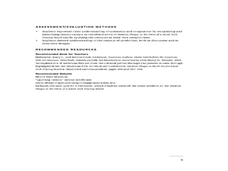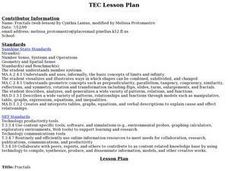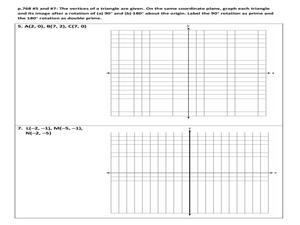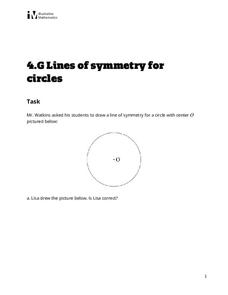Biology Junction
Flatworms
In this flatworms instructional activity, high schoolers identify and color the different parts of a flatworm. They complete 14 short answer questions related to the topic.
Curated OER
Bubbles
Students observe the characteristics of bubbles. For this scientific inquiry lesson, students use a bubble solution and a wand to make bubbles and observe their characteristics. Students identify the shape and the color of the bubbles.
Curated OER
Jelly Bean's Galore
Students investigate the origins of the Jelly Bean. They complete a Scavenger Hunt using the jellybean website. Pupils create a bar graph using information collected about jelly beans. Students discuss the time of year that Jelly Beans...
Curated OER
Wonderful Worms
Students identify living and non-living things and explain the importance of earthworms to the soil. They name some basic facts about earthworms, recognize basic worm vocabulary words and demonstrate vermicomposting techniques.
Curated OER
Creeping and Crawling Observing Mealworms and Earthworms
Students observe the inherited traits in earthworms and mealworms. In this organisms lesson, students view a live mealworm and earthworm on a tray and identify the body parts. Students measure the worms and observe the behavior....
Curated OER
Kure Waste Chase Game Lesson
Students work together to identify marine debris. They explain the effect of the debris on various ecosystems. They draw different types of ocean currents as well.
Curated OER
Make a Volcano Foldable
In this volcano worksheet, students make a "foldable" for the three types of volcanoes. They identify the volcano types, the type of lava, the type of eruption, the location of the volcano and the slope on one of three cards in the...
Curated OER
Classifying Conic Sections
In this conic section worksheet, students classify 8 conic sections. They write the standard form of 8 conic sections. Students sketch the graph of six shapes. For the graphs, students are directed to find either vertex and focus, or...
Curated OER
States of Matter
Student explore states of matter. In this science lesson plan, young scholars define matter, identify the states of matter, tell about the properties of each state of matter, and demonstrate an understanding of the difference between a...
Curated OER
Design a Plankton
Students explore animal and plant adaptation. In this ecosystems science lesson, students view websites to gain information about plankton and its interdependence within ecosystems. Students identify ways in which plankton...
Curated OER
Hangtags and Labels
Students brainstorm the information found on hangtags and labels. They discuss the necessity of hang tags and create a hangtag to advertise or identify themselves. Afterward, they share their tags with their peers and answer discussion...
Curated OER
Tree Talk
Learners discuss trees, leaves, and the growth process For this 1st - 3rd grade lesson plan, students identify various types of leaves, recognizing the differences in size and shape. Learners create tracings of various leaves to...
Curated OER
Symmetry and Symbols
Students identify symmetrical and congruent elements in folk art. In this art and geometry lesson, students examine pictures of Masonic Plaque in the Form of a Royal Arch Tracing Board for evidence of congruent and symmetrical elements....
Curated OER
Structure and Function of Bulbs, Corms and Rhizomes
Students explore the concept of philanthropy and why people give. They investigate the importance of the tulip to Holland and the tradition of giving flowers away. They begin to explore the life cycle of tulips and dissect a bulb to...
Curated OER
Genetics Basics
In this basics of genetics worksheet, students review the concepts of genetic inheritance by writing the alleles for genetic traits inherited in offspring. They identify dominant and recessive traits given allele pairs, answer five...
Center for Innovation
Air Pollution: What's the Solution?
In this air pollution worksheet, students collect data for their county of residence as well as 10 surrounding counties including the total population and the county grade for the air. They use a map of their state and identify the 10...
Curated OER
What are Fractals?
Middle and high schoolers identify and analyze fractals and research information using the Internet to locate information about them. They look at fractals in relation to nature and other real world situations. Pupils create several...
Curated OER
Magnetic Bookmarks
Learners design magnetic bookmarks with healthy living messages. They decide on the shape, length, color, and type of material to use for creating their bookmark. Students write in an "inventor's journal" about their design and...
Curated OER
The Function Box
Students explore arithmetic and numerical patterns. After observing a teacher created function box, students describe a pattern and predict what will "come out" of the function box. They explore patterns such as geometric shapes,...
Curated OER
Transformations
In this geometry learning exercise students rotate, reflect, and translate geometric shapes. The four page learning exercise contains seventeen problems Solutions are not provided.
Inside Mathematics
Hexagons
Scholars find a pattern from a geometric sequence and write the formula for extending it. The worksheet includes a table to complete plus four analysis questions. It concludes with instructional implications for the teacher.
Owl Teacher
Introduction to World of Geography Test
Assess your learners on the five themes of geography and the most important key terms and concepts from an introductory geography unit. Here you'll find an assessment with 15 fill-in-the-blank and 14 multiple-choice questions, sections...
Illustrative Mathematics
Lines of Symmetry for Circles
Further your instruction on geometrical symmetry with an investigation of circles. Fourth graders come to realize that the lines of symmetry of a circle are infinite.
Curated OER
Cones, Cylinders, Spheres
Students classify polygons by name and shape. In this geometry lesson, students identify the lateral surface of each conic. They differentiate between cones, cylinders and spheres.























